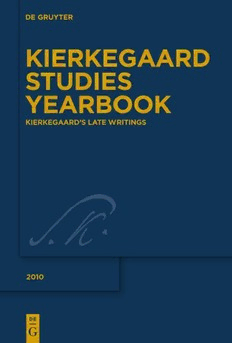
Kierkegaard's Late Writings PDF
Preview Kierkegaard's Late Writings
Kierkegaard Studies Yearbook 2010 Kierkegaard Studies Edited on behalf of the Søren Kierkegaard Research Centre by Niels Jørgen Cappelørn and Hermann Deuser De Gruyter Yearbook 2010 Kierkegaard’s Late Writings Edited by Niels Jørgen Cappelørn, Hermann Deuser and K. Brian Söderquist De Gruyter KierkegaardStudies EditedonbehalfoftheSørenKierkegaardResearchCentre byNielsJørgenCappelørnandHermannDeuser Yearbook2010 EditedbyNielsJørgenCappelørn,HermannDeuser andK.BrianSöderquist ISBN 978-3-11-022301-9 e-ISBN 978-3-11-022302-6 ISSN 1612-9792 LibraryofCongressCataloging-in-PublicationData Kierkegaard’s late writings / [edited by] Niels Jørgen Cappelørn, HermannDeuser,K.BrianSöderquist. p.cm.(cid:2)(Kierkegaardstudies,ISSN1430-5372;yearbk.2010) Includesbibliographicalreferencesandindex. ISBN978-3-11-022301-9(hardcover:alk.paper) 1. Kierkegaard, Søren, 1813(cid:2)1855. 2. Christianity (cid:2) Philosophy. I. Cappelørn, Niels Jørgen. II. Deuser, Hermann, 1946(cid:2) III. Söder- quist,K.Brian. B4378.C5K44 2010 1981.9(cid:2)dc22 2010032804 BibliographicinformationpublishedbytheDeutscheNationalbibliothek TheDeutscheNationalbibliothekliststhispublicationintheDeutsche Nationalbibliografie;detailedbibliographicdataareavailableintheInternet athttp://dnb.d-nb.de. ©2011WalterdeGruyterGmbH&Co.KG,Berlin/NewYork Printing:Hubert&Co.GmbH&Co.KG,Göttingen (cid:3)Printedonacid-freepaper PrintedinGermany www.degruyter.com Preface The year 2009 was a time of structural transition for the Søren Kierke- gaard Research Centre. From 1994 until the end of 2009, the Research Centre was the site of two primary forms of interrelated research, one concentrated on philological and historical details related to the new Danish scholarly edition of Kierkegaard(cid:204)s writings, Søren Kierkegaards Skrifter(SKS),andtheotherfocusedonthecontinuedevolutionofKier- kegaardinterpretation.DuringthesefirstfifteenyearsoftheCentre(cid:204)sex- istence – funded by grants from the Danish National Research Founda- tion and the Danish government and, in 1999, officially designated “The Søren Kierkegaard Research Centre Foundation” – the two re- search wings of the Centre were housed under one roof and together formedanautonomousinstitutionwithclosetiestothegreaterUniversi- tyofCopenhagensystem.Beginningin2010,theCentreunderwentsome administrativeandstructuraltransformations:thewingoverseeingschol- arly activities became structurally independent from the philological wing, though both are still housed under one roof at the Vartov building inCopenhagen.ThephilologywingthatoverseesthepublicationofSKS, tobecompletedin2012,isstillcalled“TheSørenKierkegaard Research CentreFoundation.”Meanwhile,thescholarlyactivitieswinghasbeenin- tegrated into the University of Copenhagen proper as a new department attheFacultyofTheology,andisknownas“TheSørenKierkegaardRe- search Centre–University ofCopenhagen.”AspartoftheUniversityof Copenhagen, the Centre is now directly responsible for Kierkegaard re- lated education, conferences, and seminars. Visiting senior scholars and graduate students continue to make up an integral part of the Centre(cid:204)s profile at the Vartov building and, as always, the Centre will continue to welcome international scholars into the Centre community. During this transition period, due in large part to budgetary con- straints, the Centre was unable to host the annual summer seminar. The seminar that was to have taken place in 2009 would have had been themed on the last writings in Kierkegaard(cid:204)s published works, namely “The High Priest”—“The Woman Who Sinned”—˝The Tax Collector,” Three Discourses at Friday Communion; Practice in Christianity; An Ed- ifying Discourse (1850); Two Discourses at Friday Communion (1851); andOnMyWorkasanAuthor.AsreadersofKierkegaardStudies:Year- VI Preface book know, the papers delivered at the annual Research Seminar in Au- gustformedthebasisforourpublication,andwhilewe,theeditors,were unabletodrawonsuchpapersforthisvolume,wehaveaskedagroupof scholars to submit articles about these texts. These comprise the second section of the Yearbook. Thus, with this volume, we have completed our goal of publishing a body of secondary literature that treat every one of Kierkegaard(cid:204)s works from 1838 to 1851 published in SKS. Because this volume marks the completion of a fifteen year project, the editors have chosen to mark the occasion with a series of studies by the members of the original “Scholarly Committee” at the Centre, who served in this capacity from 1994 to 1998, and who were founding mem- bersoftheYearbookeditorialboard,namely,Prof.Dr.Dr.theol.h.c.Her- mannDeuser,Prof.Dr.C.StephenEvans,Prof.Dr.AlastairHannay,and Prof. Dr. Bruce H. Kirmmse. We have asked these scholars to reflect on the reasons they originally became engaged with Kierkegaard, and what they have taken away from a career in dialogue with Kierkegaard(cid:204)s au- thorship. These reflections make up the first section of this volume of the Yearbook. Wehavealsoaskedagroupofyoungscholarswhowereinresidence attheCentreandwhohaverecently finishedPh.D.dissertationstowrite articles on one of the central aspects of their research. Their studies are found in the third section. ThisvolumeoftheYearbookisalsothelastoneoverseenbythepres- ent editors. The future of the Yearbook is unclear at the moment, and thoughsomeoftheoriginalaimshavebeenmet,theeditorsandpublish- eragreethatitscontinuedpublicationwouldbevaluablefortheKierke- gaard community. It has been greatly satisfying as editors to follow the developmentandevolutionofKierkegaardscholarship,notleastbecause it has been possible to see at close hand the work of brilliant younger scholars who have already made significant contributions with nuanced interpretations of Kierkegaard(cid:204)s work, and who will no doubt continue to do so in the future. We are pleased that the Yearbook has been listed as a B level journal on the “European Reference Index for the Human- ities (ERIH): Philosophy,” which reflects the quality of the contributions over the years. We would like to take this opportunity to thank Walter de Gruyter Verlag and Dr. Albrecht Dçhnert, the Editor-in-Chief responsible for Kierkegaardrelatedpublications,fortheircontinualsupportandproduc- tive cooperation. The cover of the Yearbook has changed from time to time over the past fifteen years, and in these changes, we recognize the Preface VII professional expertise involved in making the appearance of Yearbook stand out as a scholarly publication. Atthesametime,wewishtothankphilologicalassistant IreneRing, without whom this volume, and others preceding it, could not have been completed. She has succeeded with the trying task of locating and recti- fyingtheinconsistencies–fromarticletoarticleandfromvolumetovol- ume–thatinevitablyarisewithapublicationofthissort.Aseveryeditor and author has experienced, it is one thing to read a set of publication guidelines, it is another to successfully follow them. Irene has likewise overseen the collection of all the information published in the “News” sectionoftheYearbook,andhasaptlymanagedinternalandexternalcor- respondence. July 2010 Niels Jørgen Cappelørn Hermann Deuser K. Brian Sçderquist Contents Section 1 HermannDeuser WarumimmerwiederKierkegaard? ......................... 3 C.StephenEvans Why Kierkegaard Still Matters – and Matters to Me .......... 21 Alastair Hannay Why Kierkegaard in Particular? ............................ 33 Bruce H. Kirmmse Poetry, History – and Kierkegaard .......................... 49 Section 2 SylviaWalsh Comparing Genres: The Woman Who Was a Sinner in Kierkegaard(cid:204)s Three Discourses at the Communion on Fridays and An Upbuilding Discourse .............................. 71 Vincent Delecroix Final Words: Training in Christianity as a Terminal Writing .... 91 Pierre B(cid:240)hler „ModsigelsensTegn“.EinekleinechristologischeSemiotik ..... 117 DavidR.Law The Existential Chalcedonian Christology of Kierkegaard(cid:204)s Practice in Christianity .................................... 129 Joel D. S. Rasmussen Poetry,Piety,andPaideiainKierkegaard(cid:204)sPracticeinChristianity 153
